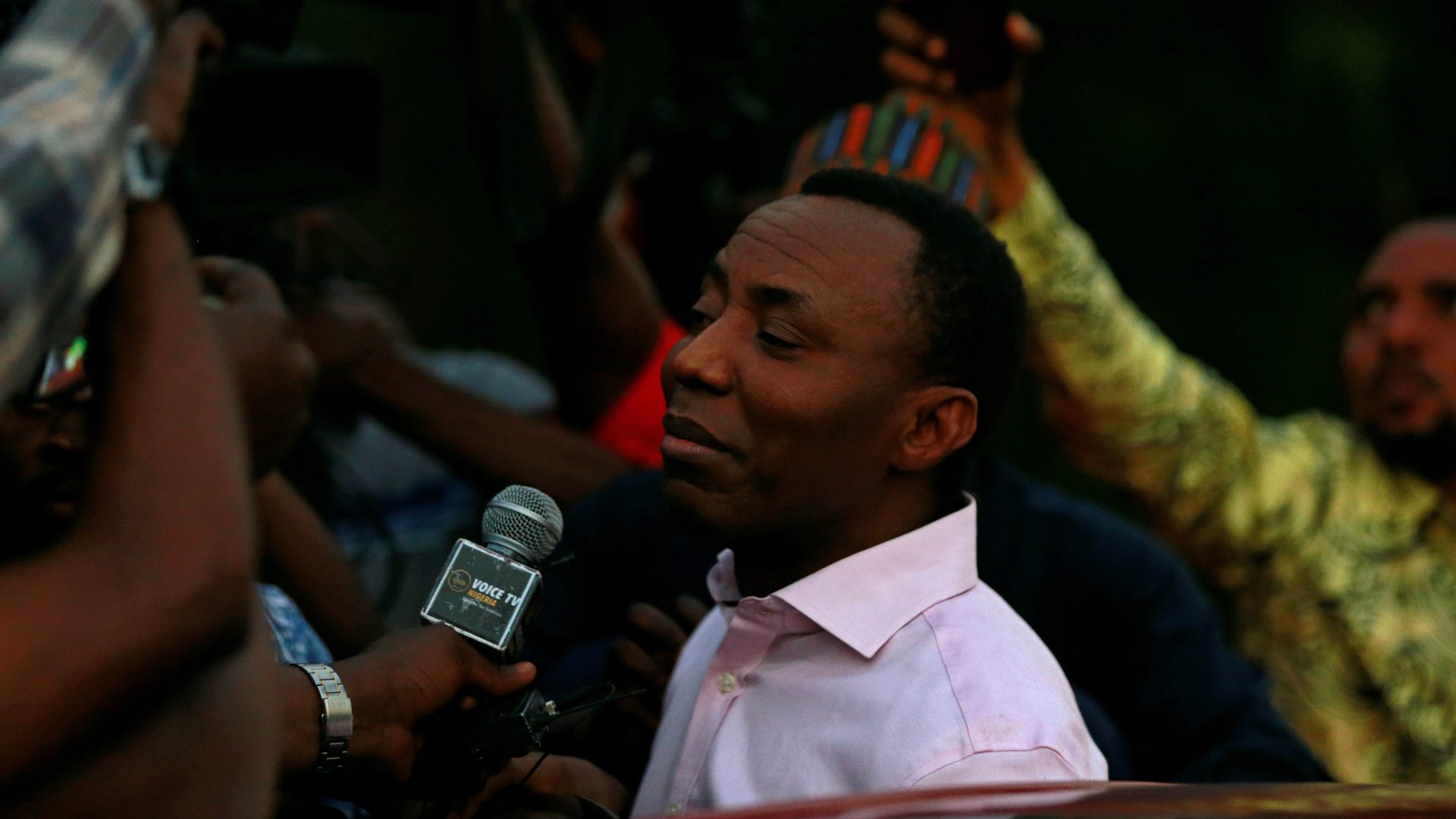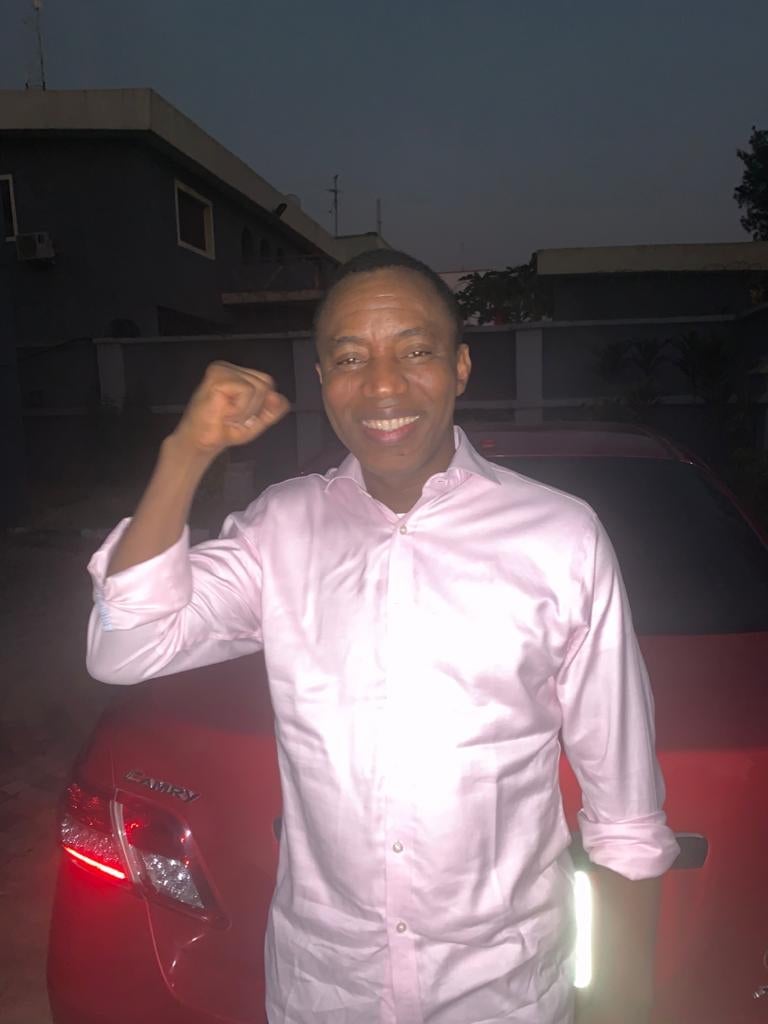Nigeria has released a New York-based journalist from detention after international pressure
Local and international pressure on the Nigerian government appears to have yielded fruit with the ordered release on bail of journalist and activist Omoyele Sowore and an influential former national security adviser, Sambo Dasuki.


Local and international pressure on the Nigerian government appears to have yielded fruit with the ordered release on bail of journalist and activist Omoyele Sowore and an influential former national security adviser, Sambo Dasuki.
Nigeria’s attorney general Abubakar Malami gave the order in a statement released in Abuja on Christmas Eve.
The statement overrides the Department of State Security (DSS)’s decision to ignore court orders for release on bail of the two. Dasuki has been held in detention since 2015 while Sowore has been held since Aug. 3, 2019. Two courts have previously ordered the release of the two on bail without DSS complying with the order.
The attorney-general made it clear the two defendants are not free from the charges against them. “The two defendants are enjoined to observe the terms of their bail and refrain from engaging in any act that is inimical to public peace and national security as well as their ongoing trial which will run its course in accordance with the laws of the land.”

Sowore, for instance, will not be able to return to his family in New Jersey for Christmas because the terms of his bail restricted him to Abuja.
In his first public statement as he emerged from DSS detention, Sowore said to the media: “The only thing is to thank Nigerians; they made this happen; they should not relent,” he said. “Nobody can take a people who are determined for granted.”
While Sowore has been in detention since August, it was his dramatic forcible re-arrest earlier this month in an Abuja court less than 24 hours after being released on bail that drew international attention and heavy criticism at home and abroad for the Nigerian government. Sowore, who ran for presidential office against president Buhari in February has been accused of attempting to organize a revolution against the government.
Just last week, US Senators Robert Menendez, Charles Schumer, Christopher Coons, Cory A. Booker and US House of Representatives Bill Pascrell and Josh Gottheimer, sent a letter to Nigeria’s Attorney General of Nigeria. In the letter they reminded Malami Nigeria risked losing its standing as a leading democracy in Africa, its close relationship with the United States and have its name tarnished if the government continued to ignore court order to release Sowore.
While many in Nigeria had taken this case as singular matter between one journalist Sowore, founder of Sahara Reporters, and the Nigerian government, it quickly ballooned, giving Nigeria a bad name at a time when it could not afford one. But more importantly, it is most likely going to lead to permanent policy changes with countries that have been supportive of various efforts by Buhari’s government to restore security across Nigeria.
Last week, at the US House of Representative’s Committee on Oversight and Reform sitting on the subject of US Counterterrorism Priorities and Challenges in Africa, Judd Devermont, the Africa Program director at the Center for Strategic and International Studies advised US lawmakers to stand up for human rights and democracy. He said such a stance was fundamental to US counterterrorism strategy. “If a government is guilty of gross human rights violations, it is in the US interest to first withhold assistance and then take all necessary measures to resume engagement.” In 2017, Nigeria received $644 million in foreign aid from the United States.
Devermont, a former National Security Council director for Somalia, Nigeria, Sahel and the African Union told lawmakers that, “In African countries, when there is media pressure on their governments, when they shed light on abuses, I think that is probably the most effective anecdote to the problem set than necessarily the international community wagging their fingers.”
Within Nigeria, there were cracks even within the government and its allies outside on how the Sowore matter was being handled. A court in Abuja took a bold step to summon the head of the DSS, Yusuf Bichi and Malami, to appear before it on Dec. 23, 2019, to explain why the government was still holding Sowore.
While Sowore’s case had attained international coverage partly due to the fact Sahara Reporters is based in New York and Sowore is a resident of New Jersey, the case of Sambo Dasuki has been a much more domestic and political affair.
Dasuki was originally arrested on Dec.1, 2015 by the DSS. He was held over a $2.1 billion fraud charge involving funds meant to be used to buy arms for the Nigerian military’s fight against Boko Haram’s insurgency in the the country’s northeastern states. Even though four different judges and an ECOWAS court have granted Dasuki bail over the years the Nigerian government have ignored these orders.
Dasuki was held in a cell next to Sowore. The irony of their release on the same day is the former Nigerian national security chief believes he was locked up because of stories about him that Sowore’s Sahara Reporters published over the years.
Nigeria’s decision to order the release of Sowore and Dasuki on bail soon after Malami took over the case is an indication there may be something of an opening for a political resolution of the issue. In the meantime there is some relief for the friends and families of Dasuki who will be able to celebrate the holidays with him for the first time since 2015. As for Sowore, a video chat with his wife and children in New Jersey will have to do for now.
Sign up to the Quartz Africa Weekly Brief here for news and analysis on African business, tech and innovation in your inbox